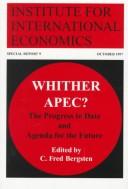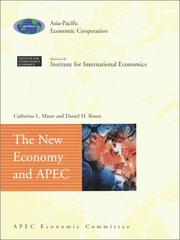| Listing 1 - 10 of 471 | << page >> |
Sort by
|
Book
Year: 1994 Publisher: Washington, D.C.
Abstract | Keywords | Export | Availability | Bookmark
 Loading...
Loading...Choose an application
- Reference Manager
- EndNote
- RefWorks (Direct export to RefWorks)

ISBN: 0881322482 Year: 1997 Publisher: Washington, D.C.
Abstract | Keywords | Export | Availability | Bookmark
 Loading...
Loading...Choose an application
- Reference Manager
- EndNote
- RefWorks (Direct export to RefWorks)
Book
Year: 1994 Publisher: Washington, D.C.
Abstract | Keywords | Export | Availability | Bookmark
 Loading...
Loading...Choose an application
- Reference Manager
- EndNote
- RefWorks (Direct export to RefWorks)
Book
Year: 1995 Publisher: Washington, D.C.
Abstract | Keywords | Export | Availability | Bookmark
 Loading...
Loading...Choose an application
- Reference Manager
- EndNote
- RefWorks (Direct export to RefWorks)
Book
Year: 1995 Publisher: Washington, D.C.
Abstract | Keywords | Export | Availability | Bookmark
 Loading...
Loading...Choose an application
- Reference Manager
- EndNote
- RefWorks (Direct export to RefWorks)
Book
Year: 1996 Publisher: Washington, D.C.
Abstract | Keywords | Export | Availability | Bookmark
 Loading...
Loading...Choose an application
- Reference Manager
- EndNote
- RefWorks (Direct export to RefWorks)
Book
Year: 1996 Publisher: Washington, D.C.
Abstract | Keywords | Export | Availability | Bookmark
 Loading...
Loading...Choose an application
- Reference Manager
- EndNote
- RefWorks (Direct export to RefWorks)

ISBN: 9810450575 Year: 2001 Publisher: Singapore APEC Economic Committee
Abstract | Keywords | Export | Availability | Bookmark
 Loading...
Loading...Choose an application
- Reference Manager
- EndNote
- RefWorks (Direct export to RefWorks)
Book
Year: 2021 Publisher: Canberra ANU Press
Abstract | Keywords | Export | Availability | Bookmark
 Loading...
Loading...Choose an application
- Reference Manager
- EndNote
- RefWorks (Direct export to RefWorks)
This is the eighth volume in the Comparative Austronesian series. The papers in this volume examine metaphors of path and journey among specific Austronesian societies located on islands from Taiwan to Timor and from Madagascar to Micronesia. These diverse local expressions define common cultural conceptions found throughout the Austronesian-speaking world.
Book
Year: 2021 Publisher: Canberra ANU Press
Abstract | Keywords | Export | Availability | Bookmark
 Loading...
Loading...Choose an application
- Reference Manager
- EndNote
- RefWorks (Direct export to RefWorks)
Given Australia's lack of energy security strategy, it is not surprising that the country is void of institutional knowledge and know-how of Russian foreign energy strategy. The 'lucky country’ as it were, relies entirely on sea-lines of communication to the north to supply fuel and to export Australian coal and natural gas. Australia has entered the 2020s as the world’s largest liquefied natural gas (LNG) exporter; however, maintaining complacency in Canberra’s current export activities will ultimately lead to a long-term security crisis. This book critically examines Russian energy strategy in the Asia-Pacific, with a view to determining the security implications for Australia. Russia is important for global energy security chains because of its vast resource wealth and its geographical position – a pivotal position to supply both the European and Asian markets. Australia has no such luxury, geographically constrained as an island continent; it relies on the nearby Asia-Pacific import market to demand our energy and to facilitate the delivery of our national oil supplies. Understanding Russian foreign energy strategy in the region is crucial given the growing energy requirements in Australia’s emerging Asia-Pacific arena.
| Listing 1 - 10 of 471 | << page >> |
Sort by
|

 Search
Search Feedback
Feedback About UniCat
About UniCat  Help
Help News
News